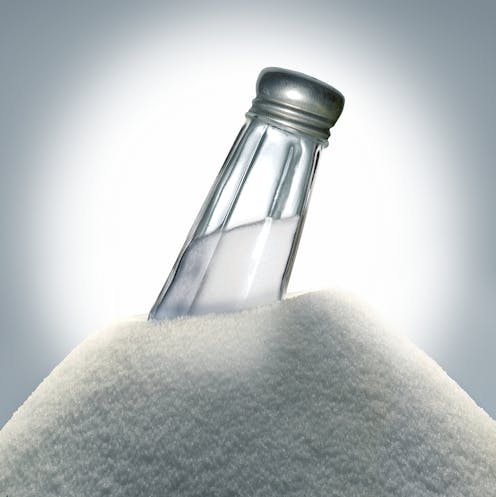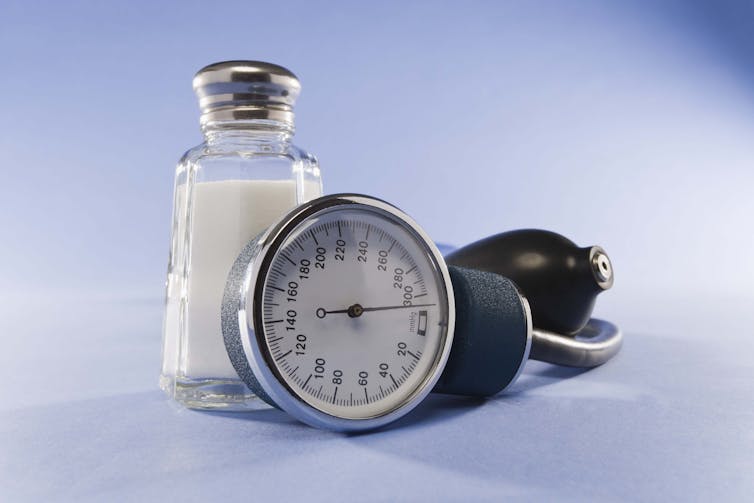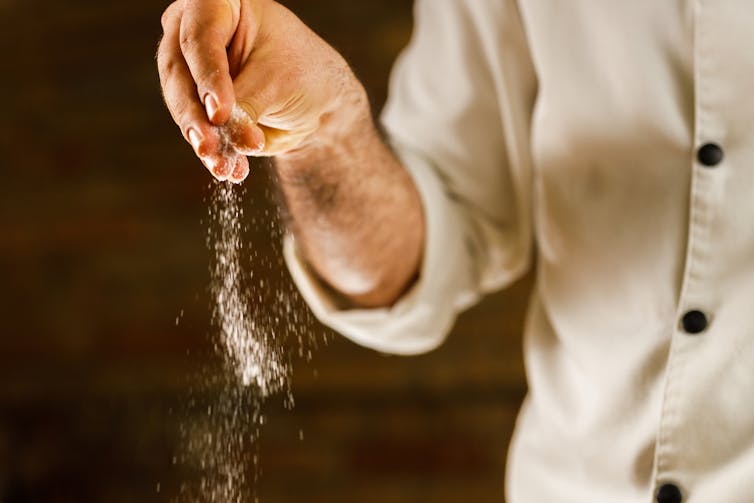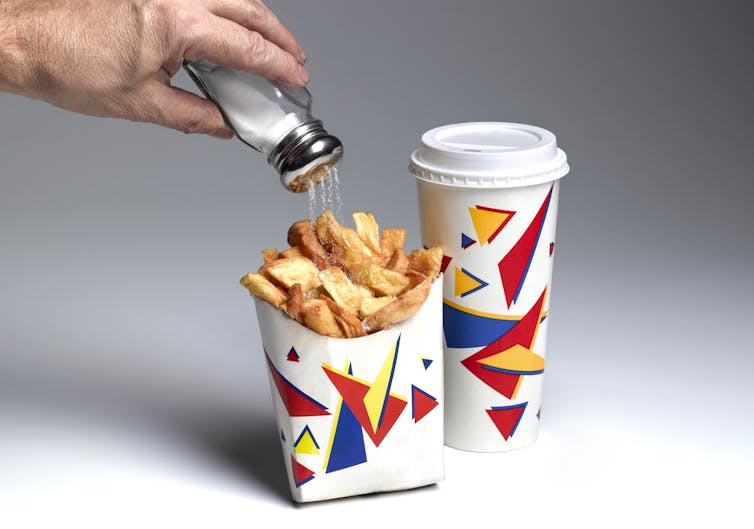
People have been using salt since the dawn of civilization to process, preserve and enhance foods. In ancient Rome, salt was so central to commerce that soldiers were paid their “salarium,” or salaries, in salt, for instance.
Salt’s value was in part as a food preservative, keeping unwanted microbes at bay while allowing desired ones to grow. It was this remarkable ability to regulate bacterial growth that likely helped spark the development of fermented foods ranging from sauerkraut to salami, olives to bread, cheese to kimchi.
Today, salt has become ubiquitous and highly concentrated in increasingly processed diets. The evidence has mounted that too much salt – specifically the sodium chloride added to preserve and enhance the flavor of many highly processed foods – is making people sick. It can cause high blood pressure and contribute to heart attacks and stroke. It is also associated with an increased risk of developing stomach and colon cancer, Ménière’s disease, osteoporosis and obesity.
How might a substance previously thought worth its weight in gold have transformed into something many medical institutions consider a key predictor of disease?
Salt lobbyists may be one answer to this question. And as a gastroenterologist and research scientist at the University of Washington, I want to share the mounting evidence that microbes from the shadows of your gut might also shed some light on how salt contributes to disease.
Table of Contents
Blood pressure cookers
Sodium’s role in blood pressure and heart disease results largely from its regulating the amount of water inside your blood vessels. In simple terms, the more sodium in your blood, the more water it pulls into your blood vessels. This leads to higher blood pressure and subsequently an increased risk for heart attack and stroke. Some people may be more or less sensitive to the effects salt has on blood pressure.
Recent research suggests an additional way salt may raise blood pressure – by altering your gut microbiome. Salt leads to a decrease in healthy microbes and the key metabolites they produce from fiber. These metabolites decrease inflammation in blood vessels and keep them relaxed, contributing to reduced blood pressure.

Jupiterimages/Stockbyte via Getty Images
With the exception of certain organisms that thrive in salt called halophiles, high levels of salt can poison just about any microbe, even ones your body wants to keep around. This is why people have been using salt for a long time to preserve food and keep unwanted bacteria away.
But modern diets often have too much sodium. According to the World Health Organization, healthy consumption amounts to less than 2,000 milligrams per day for the average adult. The global mean intake of 4,310 milligrams of sodium has likely increased the amount of salt in the gut over healthy levels.
Salt of the girth
Sodium is connected to health outcomes other than blood pressure, and your microbiome may be playing a role here, too.
High sodium diets and higher sodium levels in stool are significantly linked to metabolic disorders, including elevated blood sugar, fatty liver disease and weight gain. In fact, one study estimated that for every one gram per day increase in dietary sodium, there is a 15% increased risk of obesity.
A gold-standard dietary study from the National Institutes of Health found that those on a diet of ultraprocessed foods over two weeks ate about 500 more calories and weighed about 2 pounds more compared with those on a minimally processed diet. One of the biggest differences between the two diets was the extra 1.2 grams of sodium consumed with the ultraprocessed diets.
A leading explanation for why increased salt may lead to weight gain despite having no calories is that sodium increases cravings. When sodium is combined with simple sugars and unhealthy fats, these so-called hyperpalatable foods may be linked to fat gain, as they are particularly good at stimulating the reward centers in the brain and addictionlike eating behaviors.

skynesher/E+ via Getty Images
Salt may also connect to cravings via a short circuit in the gut microbiome. Microbiome metabolites stimulate the release of a natural version of weight loss drugs Wegovy and Ozempic, the gut hormone GLP-1. Through GLP-1, a healthy microbiome can control your appetite, blood sugar levels and your body’s decision to burn or store energy as fat. Too much salt may interfere with its release.
Other explanations for salt’s effect on metabolic disease, with varying amounts of evidence, include increased sugar absorption, increased gut-derived corticosteroids and a sugar called fructose that can lead to fat accumulation and decreases in energy use for heat production.
Desalin-nations
While many countries are implementing national salt reduction initiatives, sodium consumption in most parts of the world remains on the rise. Dietary salt reduction in the United States in particular remains behind the curve, while many European countries have started to see benefits such as lower blood pressure and fewer deaths from heart disease through initiatives like improved package labeling of salt content, reformulating foods to limit salt and even salt taxes.
Comparing the nutrition facts of fast-food items between countries reveals considerable variability. For instance, McDonald’s chicken nuggets are saltiest in the U.S. and even American Coke contains salt, an ingredient it lacks in other countries.

Peter Dazeley/The Image Bank via Getty Images
The salt industry in the U.S may have a role here. It lobbied to prevent government regulations on salt in the 2010s, not dissimilar from what the tobacco industry did with cigarettes in the 1980s. Salty foods sell well. One of the key voices of the salt industry for many years, the now-defunct Salt Institute, may have confused public health messaging around the importance of salt reduction by emphasizing the less common instances where restriction can be dangerous.
But the evidence for reducing salt in the general diet is mounting, and institutions are responding. In 2021, the U.S. Department of Agriculture issued new industry guidance calling for a voluntary gradual reduction of salt in commercially processed and prepared foods. The Salt Institute dissolved in 2019. Other organizations such as the American Frozen Food Institute and major ingredient suppliers such as Cargill are on board with lowering dietary salt.
From add-vice to advice
How can you feed your gut microbiome well while being mindful of your salt intake?
Start with limiting your consumption of highly processed foods: salty meats (such as fast food and cured meat), salty treats (such as crackers and chips) and salty sneaks (such as soft drinks, condiments and breads). Up to 70% of dietary salt in the U.S. is currently consumed from packaged and processed foods.
Instead, focus on foods low in added sodium and sugar and high in potassium and fiber, such as unprocessed, plant-based foods: beans, nuts, seeds, whole grains, fruits and vegetables. Fermented foods, though often high in sodium, may also be a healthier option due to high levels of short-chain fatty acids, fiber, polyphenols and potassium.
Finally, consider the balance of dietary sodium and potassium. While sodium helps keep fluid in your blood vessels, potassium helps keep fluid in your cells. Dietary sodium and potassium are best consumed in balanced ratios.
While all advice is best taken with a grain of salt, your microbiome gently asks that it just not be large.
![]()
Christopher Damman is on the scientific advisory board at Oobli and One BIO.

























